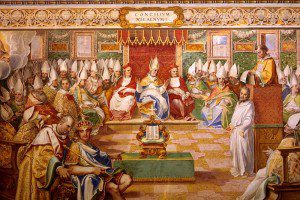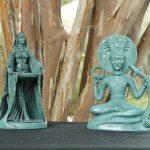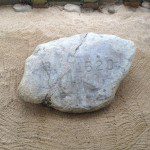
Decisions are made by those who show up.
Every time I compare the running debates on the Pagan internet to the Council of Nicaea I get pushback. Some of this is understandable. The Council of Nicaea was one of the most important events in the establishment of Christianity as the dominant religion of Europe and its output has helped define Christian orthodoxy for over 1600 years. It is no surprise that Pagans – many of whom left Christianity under unpleasant circumstances – have no desire to emulate Christian institutions and processes.
The comparison is not perfect. We Pagans have no imperial mandate, we have no fixed agenda, we will issue no creeds and we will canonize no scriptures. The outcome of our debates will be many varieties of Pagan belief and practice, not one catholic (i.e. – universal) Paganism.
But there is an important lesson to be learned from the Council of Nicaea, so please bear with me while I summarize what happened.
In 325 CE the Roman Emperor Constantine sent out a call for all Christian bishops to participate in a council to settle various disagreements within the still-new Christian church – the nature of the relationship between the Father and the Son and the date of Easter being the most prominent. The precise agenda isn’t relevant to the modern Pagan comparison.
What’s relevant is that 1800 bishops were invited to participate in the council. 300 showed up. Those 300 bishops made decisions that are still in effect today.
What would the Council of Nicaea been like if the other 1500 bishops had attended? What would it have done differently if ordinary priests had also been invited, or lay Christians?
The orthodox Christian position is that the Council was guided by the Holy Spirit and thus would have reached the same conclusions no matter who was involved. Perhaps. Others say those 300 bishops were a representative sample of Christian thought at the time and thus reached the same conclusions as if Constantine had polled all of Christendom. Perhaps. Still others argue that those who made the long and difficult journey to Nicaea (in what is now northern Turkey) were the most invested and most passionate and therefore would have carried the argument no matter who attended. Perhaps.
What would the Council of Nicaea been like if more than 300 bishops had participated? We’ll never know. Here’s what we do know: major decisions were made by those who showed up.
We can debate when modern Pagan religion began, but such a debate is impossible to settle. What’s important for our purposes is that modern Pagan religion is a new religion. We’re still figuring out what we want to be when we grow up. Even if we work within the Four Centers model, there is little agreement as to what constitutes Nature-centered, Deity-centered, Self-centered, and Community-centered religion. To use a biological comparison, we are in the middle (or perhaps even the beginning) of an evolutionary explosion where many species arise. Over time, the less fit variations will die off and the more fit variations will continue.
The first phase of modern Paganism spread by direct personal contact, through one on one teaching and initiation. The second phase spread by books, with writers like Starhawk, Margot Adler, and Scott Cunningham making the rise of solitary practitioners possible. The current phase of Paganism is being spread by the internet and while some voices are louder than others, anyone with a computer and some basic writing skills can contribute to the discussion.
Jason Mankey argues that Pagan bloggers have little influence because our readership is so low. He’s right, if you’re talking about any one individual. But ideas spread through social media, and those that are particularly helpful (or sadly, particularly controversial) can quickly find their way to thousands of Pagans worldwide.
Who are the Gods? What are the Gods? How can we best interact with Them? Why do we want to interact with Them?
What are Pagan values and virtues? How can we best embody them in a society that seems interested only in the next shiny new distraction?
What are our obligations to Nature? What are our obligations to other humans and other species?
How can we best learn and grow ourselves?
What stories best help us live full and honorable lives?
These are some of the many questions any religion must answer. What answers will Pagans propose? What answers will Pagans find helpful? What answers will Pagans discard?
Every generation builds on the foundations laid by the previous generation. I look at my bookshelf and I see Isaac Bonewits, Philip Carr-Gomm, and Ronald Hutton. I see Thorn Coyle and Brendan Myers. These and many others have influenced my Paganism – my practice starts here.
What will the Pagans of 2050 use as a starting point? The Pagans of 2100? The Pagans of centuries and millennia to come?
I don’t know.
What I do know is that our conversations are shaping the future of Paganism. Slowly, incrementally, by trial and error, by consensus and by strength of will, decisions are being made and they’re being made by those who participate in the discussions.
Decisions are made by those who show up.
You say you don’t like theology? That’s fine – we’re also trying to figure out which holidays to celebrate and how to celebrate them. We’re trying to figure out which spiritual practices draw us closer to the Gods, to each other, and to our better selves… and we’re trying to figure out which practices are a colossal waste of time. We’re trying to figure out what our pre-Christian ancestors really thought and did, and how much of that we should adopt into our lives.
Decisions are being made by those who show up.
You prefer a this-world, this-life religion? We’re trying to decide how we can best change the world through mainstream politics… or if we should participate in politics at all. We’re trying to figure out where direct personal action is needed. We’re trying to decide what our obligations are to other people, other species, and other ecosystems, and how we can best fulfill those obligations.
Decisions are being made by those who show up.
You couldn’t participate in all these discussions even if you wanted to – you’d spend all your time debating and have nothing left for doing, for actually being a Pagan. That’s why my favorite blogs (see the blogroll on the right) are mostly written by people who aren’t just talking Paganism, they’re doing Paganism.
These are some of the people who are showing up. They’re showing up to do the work and then they’re showing up to tell the rest of us what they’ve done and how well it worked.
What an amazing opportunity we have. What an awesome responsibility we have.
You don’t have to participate, but remember those 1500 bishops who stayed home. Decisions are made by those who show up.


















